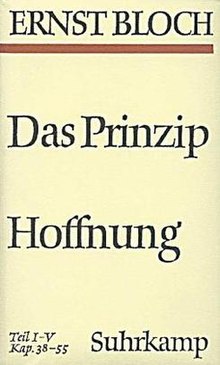The Principle of Hope

Cover of the German edition
|
|
| Author | Ernst Bloch |
|---|---|
| Original title | Das Prinzip Hoffnung |
| Translator | Neville Plaice, Stephen Plaice, Paul Knight |
| Country | Germany |
| Language | German |
| Subject | Utopia |
| Published |
|
| Media type | Print (Hardcover and Paperback) |
| ISBN | (vol. 1) 978-0262522007 (vol. 2) 978-0262522014 (vol. 3) |
The Principle of Hope (German: Das Prinzip Hoffnung) is a book by Ernst Bloch that has become fundamental to dialogue between Christians and Marxists. It was published in three volumes in 1954, 1955, and 1959. Bloch explores utopianism, studying the utopian impulses present in art, literature, religion and other forms of cultural expression, and envisages a future state of absolute perfection.
Originally written between 1938 and 1947 in the United States, an enlarged and revised version of The Principle of Hope was published successively in three volumes in 1954, 1955, and 1959. Bloch, who had emigrated to the United States in 1938, returned to Europe in 1949 and became a Professor of Philosophy in East Germany. Despite having initially supported the regime, Bloch came under attack for his philosophical unorthodoxy and support for greater cultural freedom in East Germany, and publication of The Principle of Hope was delayed for political reasons.
Bloch's theories have been summarized by the philosopher Leszek Kołakowski in his Main Currents of Marxism (1976), and the description that follows is based on Kołakowski's account: Bloch observes that throughout history, and in all cultures, people have dreamed of a better life and constructed various kinds of utopias. Utopian dreams are present in art forms such as poetry, drama, music and painting, and in elementary form in children's dreams, fairy-tales, and popular legend. Utopian impulses can also be found in architecture, medicine, sport, dancing and circuses, as well as in specifically utopian literature and in the entire history of religion. Some utopias relate simply to immediate private ends, but the higher kind of revolutionary utopia envisages the end of human suffering. For Bloch, the positive utopia is the expectation of absolute perfection. Revolutionary utopias of past ages were seen by Bloch as reflections of humanity's desire for perfection, post-Marxist utopias were all seen by him as reactionary. Bloch insists the only two possible outcomes to history are absolute destruction and absolute perfection.
European philosophy prior to Karl Marx was seen by Bloch as being largely content with interpreting the existing world rather than planning for a better one. For unclear reasons, philosophy appears to have been less marked by utopian impulses than other areas of culture. Bloch criticized Plato's theory that knowledge is anamnesis, the remembering of something previously forgotten, for being centered on the past, and believed that it had been repeated throughout the history of philosophy. Even philosophies that projected a future state of perfection were defective in Bloch's view, since they always imagined this state realized first in the abstract and therefore had no understanding of real change and no orientation toward the future. Such philosophies, in which perfection or salvation was represented as a return to a lost paradise instead of the creation of a new one, included those of Philo, Saint Augustine, and Georg Wilhelm Friedrich Hegel.
...
Wikipedia
